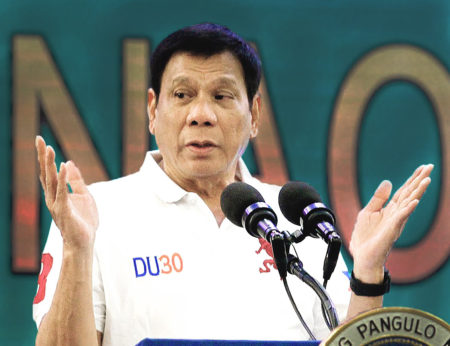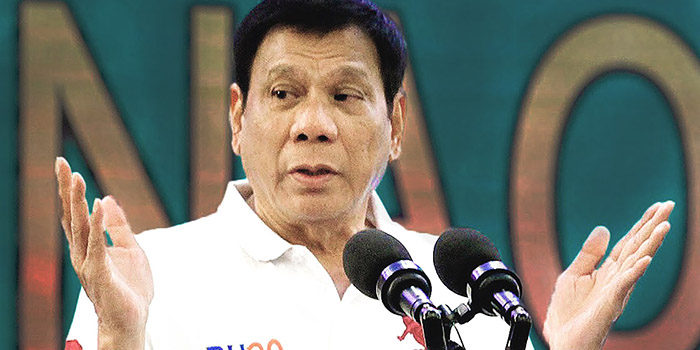Since the election of Davao City Mayor Rodrigo Duterte as the next Philippine president in a landslide victory on May 9, 2016, the regional and international media have highlighted his outrageous remarks on various sensitive topics.
For instance, he backed the extra-judicial killings of drug dealers, alleged that journalists were killed because they were corrupt, and called Philippine bishops critical of him “sons of whores”. None of these remarks have dented President Duterte’s domestic support. But they have attracted international attention and provided a negative one-dimensional view of the new leader. There is a need for a more layered understanding of President Duterte and his policies.
President Duterte is the first Philippine president who is not from the traditional land-owning elite which has dominated the critical centres of power in the capital Manila since independence. His base is in Davao City in the traditionally neglected southern Philippines. To stress this point he was in Davao when he was officially proclaimed by a joint session of the Philippine Congress on May 30 as the next President.
| President Duterte’s inauguration speech: Speeches and public comments are in English rather than Tagalog, the lingua franca of Greater Manila, signalling a shift away from Manila-centred politics. Video uploaded to YouTube by PCOO EDP |
His election signals a shift away from Manila-centred politics and an effort to reach out to hitherto marginalised sectors of Philippine society. His speeches and public comments are in English rather than Tagalog, the lingua franca of Greater Manila, which has been promoted throughout the archipelago as the national language. He has emphasised his links with Mindanao and several of his cabinet appointments hail from the region.
President Duterte also draws support from the Philippine left wing and has close ties with the founder of the Communist Party of the Philippines (CPP), Jose Sison, under whose leadership the CPP waged a Maoist-influenced guerrilla insurgency and who has been in exile in the Netherlands since 1987. Duterte has welcomed Sison’s plans to return home. Although government negotiations with the CPP since 2011 are currently at an impasse, President Duterte is more likely to reach an agreement with the CPP and its armed wing, the New People’s Army (NPA).
This opening to the left is seen in two of Duterte’s cabinet appointments who were nominated by the National Democratic Front (NDF), an NPA ally. Judy Taguiwalo, a University of the Philippines professor and women’s rights advocate, is the secretary of social welfare and development while Rafael Mariano is secretary of agrarian reform. Incoming Cabinet Secretary Leoncio Evasco Jnr, a former NPA rebel and former priest, served as President Duterte’s campaign manager and has enjoyed close ties with Duterte since the 1990s.
These appointments are balanced by pro-business technocratic appointments to key economic portfolios including secretary of finance Carlos Dominguez, who served in the cabinets of former presidents Cory Aquino and Fidel Ramos and is a close friend of Duterte from Davao City. Alfonso Cusi, secretary of energy, served in the administration of former president Cory Aquino. The secretary of economic planning, Ernesto Pernia, was lead economist at the Asian Development Bank (ADB).
Based on Duterte’s effective economic management in Davao City, economic policy is likely to follow the growth-oriented policies of former president Benigno Aquino, with greater emphasis on decentralisation, poverty alleviation, and land reform.
Former president Fidel Ramos, who served from 1992 to 1998, was an early supporter of Duterte and has been influential in pushing pragmatic policy choices. Ramos’ influence is positive as his tenure was marked by an economic transformation in the Philippines as well as a significant outreach to the NPA and Muslim rebel movements. Ramos appointees now holding Cabinet posts include peace process adviser Jesus Dureza, who held this post under Ramos.
Unclear Foreign Policy

President Duterte’s priorities are domestic. Law and order, anti-corruption and crushing the drug problem are at the top of his agenda. He aims to devolve power from the central government to the provinces. By working out of Davao so far, President Duterte is symbolically reminding Manila politicians that a political revolution is underway. He intends to shift to a federal-parliamentary system and the constitution will have to be revised.
His appointment of Major General Delfin Lorenzana as the secretary of defence reflects a desire to maintain ties with the United States even as the Philippines moves to restore its relationship with China. Lorenzana has spent most of the past two decades in Washington as defence attaché and, after his retirement in 2004, as presidential representative at the Embassy from 2004 to 2009 and again since 2013.
President Duterte’s foreign policy is still unclear. Perfecto Yasay, former head of the Philippines Securities and Exchange Commission (SEC) whose roots are in Davao City, is the new foreign secretary. As Yasay is not linked to the pro-American policies of the outgoing administration a tilt away from the United States towards a more even-handed approach is possible.
Yasay’s first challenge will be the management of the bilateral relationship with China. So far, the administration has sent mixed signals.
During his election campaign, Duterte called for bilateral talks on South China Sea claims. Post-election, he proposed a multilateral dialogue involving claimant states as well as other states including the United States, Japan and Australia. He has also said that he would not surrender the Philippines’ right to Chinese-occupied Scarborough Shoal.
Yasay has said that relations with China should improve as long as China ‘adheres to the rule of law, respects our territorial integrity and sovereignty’.
With the eclectic rainbow coalition of cabinet appointees it is not yet possible to discern a clear foreign policy and national security policy outlook. Asean is not a focus of his attention. But President Duterte is likely to be persuaded by his advisers to make the usual round of courtesy visits to his Asean counterparts.
Asean leaders at the next summit in Vientiane in November will have to deal with a disengaged leader unless issues directly concerning the Philippines are on the agenda.
While President Duterte’s priorities are domestic, international developments may yet intrude and shape the priorities of his administration.
This article was written by Barry Desker, a Distinguished Fellow, S. Rajaratnam School of International Studies (RSIS), Nanyang Technological University, Singapore. It is first appeared on East Asia Forum under a Creative Commons license and is produced here with its permission.
A version of this article first appeared on RSIS and The Straits Times.
Related:
- Rodrigo Duterte sworn in as president of Philippines (Al Jazeera)
- Dear President Duterte: Blueprint for an Independent Philippine Foreign Policy (Huffington Post)
- The Risks of Duterte’s China and South China Sea Policy (The Diplomat)
East Asia Forum
It consists of an online publication and a quarterly magazine, East Asia Forum Quarterly, which aim to provide clear and original analysis from the leading minds in the region and beyond.
Latest posts by East Asia Forum (see all)
- China’s South China Sea bullying seeing increased blowback from Asean claimants – February 2, 2022
- Illusionary, delusionary or visionary? Cambodia tests living with COVID-19 – December 6, 2021
- Prioritising a Philippine–EU FTA is vital for post-pandemic recovery – July 26, 2020
- Time for Asean to stand up for itself in the South China Sea – July 25, 2020



The statement that he is backing the extra judicial killing is totally a lie. The mainstream media was one time not allowed to have a place in his conference since they used to twist what he said. what he said was that, ” kill the drug addicts when your life is in danger in the performance of your duty” everyday 2 policemen dies in combating drugs in the country. was there any cry or report from human advocates? Nothing! before any foreign journalist or any commentator judge our president you must come and see what is a reality or what is going on when it comes to the death of the so-called extra judicial killing. are they really extra judicial killing done by the police? or done by the drug pushers and the command of the drug lords? Thank you!
Thank you for reading and taking the time to comment.
As a publication that supports good governance and policies we find the current situation in the Philippines to be extremely alarming. More than 1,700 alleged drug dealers have been killed, many by unidentified people. All of those killed were allegedly carrying weapons and many carrying very small amounts of drugs that can hardly be considered commercial quantities. That not a single person responsible for these extrajudicial killings has been apprehended is outrageous.
The people killed have mothers, fathers, brothers, sisters, and children. If guilty of breaking laws each and every citizen living in a civilized society have the basic human right to be tried in a court of law and if found guilty sentenced in accordance with the laws of the land.
That President Duterte has isolated the media, independent authorities, and international monitoring groups and refuses to be answerable for his actions while at the same time releasing lists of people allegedly involved in criminal activities, shielded from prosecution for six years by presidential immunity is outrageous.
From an orderly country of laws, the Philippines has returned to the Marcos era and a one man dictatorship where the law of the bully and gun prevails. A country where anyone can be killed as they walk home and a few bags of drugs stuffed into their pocket as justification. If just one innocent person is killed the price for this lawlessness is to high.
Ed.